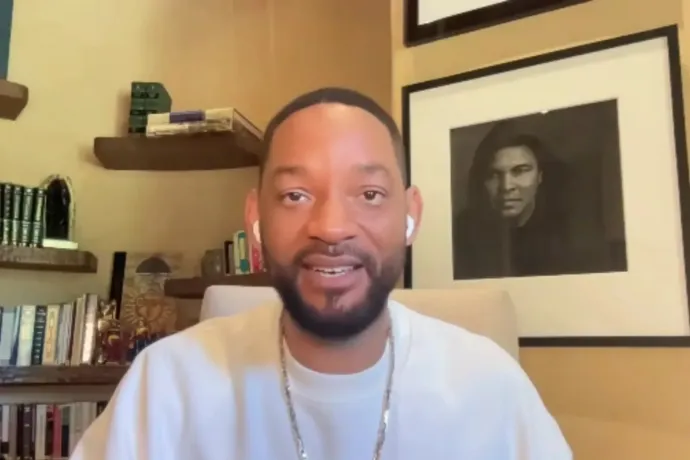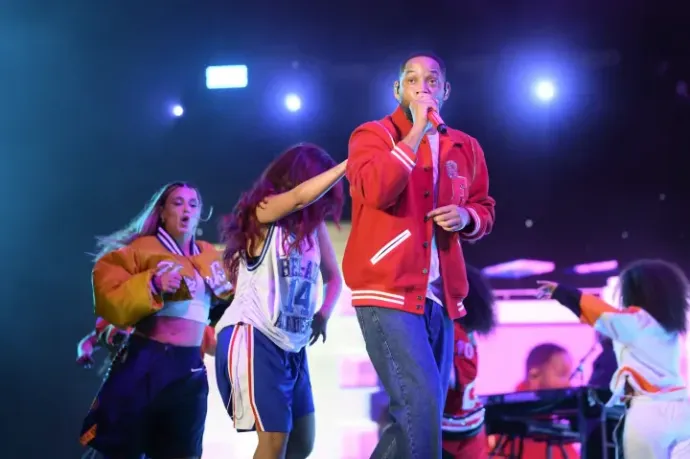
Will Smith is nearing 60 and he still has much to say; in fact, it seems as if he has only just become enlightened. He says that he has recently entered a new phase of life. One of the world's most famous actors and celebrities has now returned to rap, following a twenty-year hiatus from the genre. He released a new album in March and as part of his related tour, he will soon give a concert in Budapest.
Born in Philadelphia, Smith started out as a rapper under the name The Fresh Prince. Alongside his close friend and DJ, DJ Jazzy Jeff, they were the first formally recognized rap artists to win a Grammy Award in the “Best Rap Performance” category for their song Parents Just Don't Understand in 1989.
Smith and his colleague ended up not attending the ceremony as a protest: that year, along with several other prominent hip hop artists, they decided to boycott the Grammys because – citing time constraints – the Recording Academy, which organized the event, chose not to televise the presentation of the award for rap, even though that was the year it had been introduced as an official award category.
Smith then started to pursue acting more seriously, landing his first major role in the sitcom The Fresh Prince of Bel-Air, followed by the 1993 film Six Degrees of Separation, and two years later the first Bad Boys movie with Martin Lawrence. It was Independence Day (in 1996) which cemented his status in Hollywood. Meanwhile, he did not entirely give up music, releasing a total of four albums by 2005, before taking a twenty-year break from rap. The following years saw the release of the Oscar-nominated The Pursuit of Happyness, I Am Legend, Men in Black 3, and Gemini Man, which was filmed in Budapest.
It was during the filming of Gemini Man in 2018 that he climbed the Chain Bridge without a permit. Then in 2019, he returned to Budapest for a mini birthday concert in front of St. Stephen's Basilica. He published a memoir entitled Will in the fall of 2021, and delivered that infamous slap – the sound of which echoed in the tabloid press for nearly a year – at the 2022 Oscars. The first time Smith commented on the scandal at length was on Trevor Noah's talkshow, saying that “the little boy that watched his father beat up his mother” was there in that slap.
Last summer Smith, whose first film after the incident was Emancipation, announced that he was picking up the microphone again and would return with a new song, which was on the album that came out in the spring. Based on a True Story was released on March 28 with fourteen tracks and Smith is set to present it at Budapest Park on August 14 as part of his current tour. It was apropos of this that the actor-rapper gave an interview to Telex via Zoom.
Why did you decide to release a new album after 20 years?
I have more to say than I've had in a long time. I just feel brand new. I feel like I discovered a whole new part of myself, a whole new area of thought and emotion and creativity. I just got really excited about exploring and expressing myself in this next phase of my life and career.
Let me quote from your book called Will, which contains your first ever rap text which says: “I got an IQ of 142 and like my name, I'm a work of art”. The new album also includes a song called Work of Art, which again features the slogan "I am a work of art" in the chorus. Was it a conscious decision to bring this old line back?
You know, I think the concept is something that has developed more in my mind. It's more clear to me now. The concept of being a living work of art and how each of us as individuals is a unique work of art. A physical, biological, psychological, spiritual, one of a kind. So it’s the idea that we are individuals, the first time we've ever happened, like you've never happened in the universe before. So part of that recognition, with the good or the bad and the things you like about yourself or don't like about yourself and all of those parts are all beautiful brush strokes in the personal work of art that you are. And for me, part of the process of learning and growing and elevating is accepting that there's no perfection. It's like what I am and what you are is perfect in its one-of-a-kindness. So I wanted to make a song that sort of addressed the duality and like the multiplicity of what it means to be human. You're not just one thing. You're lots of different things. And some of them are conflicting. And even in all of that confusing muck, it's still a beautiful work of art.
Is your IQ really that high? Because you wrote that you were really good in math and sciences.
No, no. Clearly by saying that in my rap, it sort of clarified that my IQ wasn't that high. But I'm working on it.
Your album kind of feels like a motivational, sort of spiritual record. And I saw that some critics loved it and some critics said it was sort of corny. How do you process criticism? And what did it feel like to write this album and to then see these mixed reviews?
Yeah. I don't really look at reviews of my art anymore. It's like, if you haven't done it, then I don't really lend credence to the opinion necessarily. If Steven Spielberg doesn't like my movie, I want to know why. You know what I mean? And it's like, if you haven't made a movie, if you haven't made a record, there's a little bit less value in your opinion to me. So for me, when people get it and when people like it, then we can advance the ideas together. To me, that's the point of art. You put it out and then you see how it lands. But I'll just make another one. Every movie I make isn't going to be The Pursuit of Happyness. But the constant creation of the art, it's all a part of the landscape of my legacy. So we'll see where it lands 10 years from now.

In your book you write that Will Smith, the movie star is actually a carefully constructed, perfected character to cover up your fears and sort of protect yourself. Have you been able to step out of this persona or is this protective construction still present in your public appearances?
You know, it’s sort of how I've kind of been describing what I'm experiencing. The Fresh Prince was the first part of my career. And then Will Smith kind of took over for the Fresh Prince. And the Fresh Prince didn't really die, but it's like Will Smith became the main persona. And now I feel like whoever this new guy is that I am is kind of swallowing Will Smith and the Fresh Prince. So I'm going to figure out what his new name is. But it's definitely a growth and an expansion beyond the smaller constellation of ideas and beliefs that constituted the Fresh Prince and Will Smith.
So it's a duality and a third character that you are still developing.
Yeah, I think it’s part of the beauty of being an artist, you kind of get to see the elements of what the world is and what reality is. You kind of discover them as you try to explore yourself and the world in order to create. And one of the things that I discovered is the nature of the characters that we all play. You know, we all pick a series of personality traits that are the ones for Instagram, right? And then we don't talk about any of the other stuff we are. We just make the perfect persona. And, you know, these last couple of years of my life, I've been trying to be more authentic with the broader spectrum of what's actually going on in here. And I find that it deepens my artistry and increases the quality of my contribution.
In your book, you wrote that who we become is determined by how we respond to our fears — and you chose to be funny. On your recent album, it was interesting to hear how you used humor to reflect on difficult experiences and hardships from the past – like what happened in 2022. Do you still use this kind of self-deprecating humor as a coping mechanism?
I'm not sure it's like a coping mechanism as much as it was. I'm sure making jokes about things has been a coping mechanism for me for most of my life. I see it more today like I'm willing to look at whatever is real. I feel more confident. I'm willing to experience whatever is authentic. And I feel that I'm choosing comedy more as medicine than as a defense mechanism or as a coping mechanism. The world is hard and life is hard. And it's just fun to laugh. Like, you know, it's like I feel it's less out of fear that I go to comedy and more out of an acceptance of the reality that it…you know, it makes things a little bit easier if you can laugh about them.
Your memoir, Will was published in 2021. For those trying to understand what led up to difficult moments in your life, do you think the book offers meaningful insight? Or if you were to rewrite it, would you include more details in light of everything that’s happened since?
I think my book is one of the most perfect depictions of my experience and the psychology that led to the success and the creation of that phase of my life. I do think that there is another writing that I will ultimately have to do. The album was a part of the sharing of the new discoveries and the new ideas and beliefs. The album is like the first offering from this new artistic phase of my life. So I do think another book will be in the cards somewhere in the future.
In 2018, you climbed Budapest’s Chain Bridge to dance, and the Hungarian press reported on it being illegal, and then you also confirmed it on Ellen DeGeneres' show. In the end, there were no legal consequences.
It was not the wisest choice I've ever made. I will say that. And I thank the authorities of Budapest and Hungary for allowing me to come back.
Do you think the reason you weren't charged is that you are Will Smith?
No, it was more like a fun and beautiful piece of content. I wanted to show the beauty of that area from a high point. See you in Budapest for the concert!
For more quick, accurate and impartial news from and about Hungary, subscribe to the Telex English newsletter!